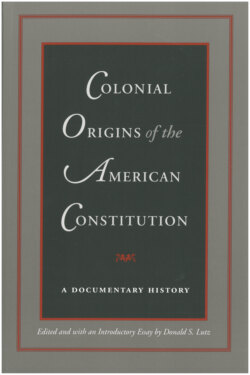Читать книгу Colonial Origins of the American Constitution - Группа авторов - Страница 12
На сайте Литреса книга снята с продажи.
Оглавление5
[The Salem Covenant of 1629]
Probably the briefest covenant in American history, the Salem document nevertheless presumed that whoever owned it was in total agreement with the Puritan-Calvinistic arm of the English established church. Salem, like many other New England settlements, was initially founded as a popular theocracy—government rested in the hands of church members. Those who did not belong to the settlement’s approved church, originally a group few in number, did not have rights of citizenship. An oath such as this one made one who took it simultaneously a member of the church and a citizen of the polity. Prospective members were subjected to a careful examination as to their knowledge, experience of grace, and godly conversation. Within a few years, as the percentage of nonchurch members grew, conflict within the colony forced the Salem community to draw up the Enlarged Covenant of 1636, which included specific articles encouraging harmony and fellowship (see The Enlarged Salem Covenant [18]). As the number of churched citizens faded into a minority, the form of a church covenant was retained, but the substance of the covenant shifted to become purely political.
Complete text and spelling taken from Williston Walker, The Creeds and Platforms of Congregationalism (Boston: The Pilgrim Press, 1960), 197.
We Covenant with the Lord and one with an other; and doe bynd our selves in the presence of God, to walke together in all his waies, according as he is pleased to reveale himselfe unto us in his Blessed word of truth.
